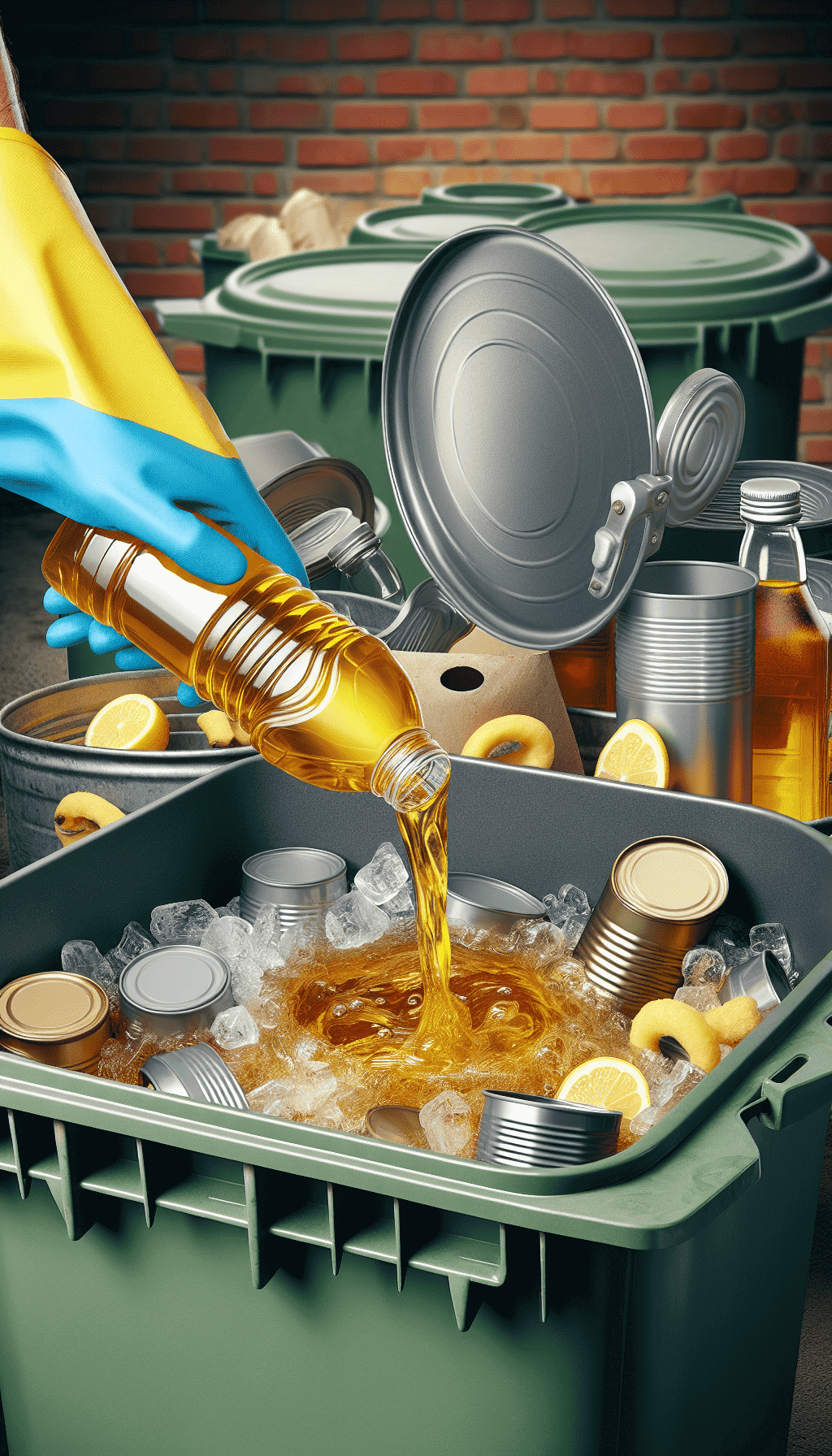- Home
- How to Dispose of Household Hazardous Waste
- How to Solidify Cooking Oil for Disposal
How to Solidify Cooking Oil for Disposal: Innovative and Eco-Friendly Methods
Disposing of cooking oil can be a messy affair, but it doesn't have to be. With the right knowledge, turning liquid oil into a solid form for eco-friendly disposal is easier than you think. Whether you're dealing with cups of oil from a weekend fry-up or the occasional tablespoon from pan-frying, there's a method suitable for every kitchen.
From freezing techniques to using a cooking oil solidifier, these methods ensure that oil in the trash doesn't have to mean harm to the environment. Solidified oil not only makes waste disposal safer but also prevents the harmful effects of waste cooking oil on wildlife and waterways. Let's explore how you can turn oil solidifying into a simple step in your kitchen routine.

Understanding the Need for Solidification Before Disposal
Why should you solidify cooking oil? Liquid oil can cause havoc in waste disposal systems and is harmful to the environment. Laura Lady, an environmental expert, explains that liquid oil can solidify at temperatures below 40 degrees Fahrenheit, causing blockages in household and city drainage systems. By solidifying cooking oil at home, you're taking a crucial step toward responsible waste management.
1. The Environmental Impact of Improper Oil Disposal
When oil ends up in the trash without being solidified, it poses significant risks to our environment. Not only does it attract pests, but it also contributes to the buildup of waste cooking oil in landfills. This can lead to soil and water contamination. Employing a cooking oil solidifier or an oil hardener can transform cups of oil into solid waste, making oil disposal safer and more sustainable.
2. Benefits of Solidifying Cooking Oil for Eco-Friendly Disposal
Using a cooking oil solidifier brings numerous benefits. It turns waste cooking oil into a manageable form, making waste disposal effortless and more hygienic. Furthermore, it reduces the risk of pollution, supporting a cleaner and greener planet. Embracing this method is a small but powerful way to contribute to environmental sustainability
Top Methods to Solidify Cooking Oil

Several effective methods are available for solidifying cooking oil, ranging from natural processes to innovative products designed specifically for this purpose.
1. Utilizing the Freezing Technique
Freezing is a simple yet effective method to solidify cooking oil. By placing the oil in a container and then in the freezer, you can turn it into a solid block. This process works because oil solidifies at lower temperatures. Once frozen, the oil can be easily removed from the container and disposed of in the trash. Make sure the oil is at room temperature before freezing to avoid container damage.
2. The Magic of Gelatine in Oil Solidification
Gelatine is a natural thickener that can solidify cooking oil effectively. By mixing gelatine with hot oil and then cooling it, the oil transforms into a jelly-like substance that's easy to handle and dispose of. This method is ideal for small to medium amounts of oil.
3. Innovative Powder Solutions for Instant Solidification
For those who frequently deep fry or pan fry, using a powder that solidifies oil can be a game-changer. These powders are designed to absorb and solidify frying oil quickly, making cleanup after a super fry session a breeze. Just sprinkle the powder into the hot oil, wait for it to solidify, and then dispose of it properly.
4. Exploring Hydrogenation as a Solidification Process
Hydrogenation is a chemical process that can turn liquid oils into a solid form. While it's not commonly used in home kitchens due to its complexity, it's an interesting method that highlights the versatility of oil transformation. This process involves adding hydrogen atoms to the oil, and changing its structure and state.
5. The Role of Polymerization in Transforming Oil
Polymerization is another scientific method that can solidify cooking oil by changing its molecular structure. This method is typically used in industrial settings to create solid fats from liquid oils. It's a fascinating example of how chemistry can provide solutions for waste management and environmental protection.
Beyond Disposal: Creative Reuses of Solidified Cooking Oil

Once you've solidified cooking oil, you're not limited to just disposing of it. Solidified oil, like vegetable oil, bacon grease, and hardened oil, can be repurposed in several creative ways, including as a biofuel or in homemade candles. This not only reduces waste but also gives a second life to something that would otherwise be discarded.
1. Transforming Oil into Biofuel: A Sustainable Alternative
Solidified cooking oil can be processed into biofuel, a sustainable energy source that can power vehicles and machinery. This repurposing method is not only eco-friendly but also economically savvy, providing an alternative to traditional fossil fuels.
2. The Historical Significance: From Cooking to Fueling WWII Efforts
During WWII, cooking oil was collected and transformed into fuel for military vehicles and equipment. This historical effort underscores the potential of repurposing cooking oil, highlighting its value beyond the kitchen.
Practical Tips for a Hassle-Free Solidification Process
To ensure a smooth solidification process, it's important to follow some practical tips. Whether you're dealing with cooking grease or looking for a solution to dispose of excess oil, remember to properly dispose of it. Pour the grease into a suitable container, consider the method that best fits the type of oil you're using, and explore solutions to dispose of the solidified product responsibly.
Safety Precautions in Handling Hot Oil
Always exercise caution when handling hot oil. Allow it to cool to a safe temperature before attempting to solidify or dispose of it. This not only ensures your safety but also makes the solidification process more effective.
Choosing the Right Method Based on Oil Type
Not all oils are the same, and the type of oil you're trying to dispose of can greatly influence the best solidification method to use. For fry oil, which is commonly used in kitchens, certain methods like polymerization or utilizing powder solutions can be more effective due to the oil's properties. It's vital to understand the nature of the oil you're dealing with to choose the most efficient and environmentally friendly disposal method.
Ensuring a Greener Tomorrow: The Lasting Benefits of Proper Oil Disposal

Proper disposal of cooking oil is more than just a matter of keeping your pipes clean; it's about safeguarding our environment. When oil is disposed of correctly, it prevents harmful pollutants from entering our waterways and soil, contributing to a healthier planet. Adopting responsible oil disposal methods is a step towards a greener, more sustainable future for everyone.
How Solidifying Cooking Oil Contributes to Environmental Sustainability
Solidifying cooking oil before disposal can significantly reduce environmental hazards. Oil can clog waterways and harm wildlife, but when solidified, it's easier to manage and dispose of responsibly. Reusing cooking oil, keeping it in an airtight container for future use, or transforming it into biofuel are all sustainable practices. Moreover, solidification prevents the urge to toss grease down the drain or bacon fat in the trash, further minimizing pollution.
mpowering Communities Through Responsible Waste Management Practices
Encouraging communities to dispose of oil into the trash after solidification, rather than pouring liquid cooking oils like olive oil down the sink drain, promotes healthier ecosystems. By integrating oil recycling and organic waste programs, communities can reduce food waste and ensure that substances like cooking fat are safely disposed of at a recycling centre. These practices not only protect the environment but also empower communities to contribute to global sustainability efforts.
More about how to dispose of household hazardous waste